As consumers, we are surrounded by personalization throughout our day. Suggestions on Amazon based on your purchases, recommendations on Netflix based on your viewing history, offers for products from all types of brands based on your browsing history, and the list goes on.
Providing personalized recommendation to drive engagement is a top priority for marketers. Check out these stats to really drill into the importance of personalization:
Research by Pure360 shows that consumers want personalization beyond the basics. Just 8% of survey respondents said that they would be encouraged to engage with a retail brand if they addressed them by their first name. Similarly, only 7% said they would be likely to engage with a birthday email.
Infosys research also revealed that 31% of surveyed consumers say they wish their shopping experience was far more personalized than it currently is.
Segment’s State of Personalization Report also states that just 22% of shoppers are satisfied with the level of personalization they currently receive.
Consumers are willing to share their data in certain instances for a more personalized experience. In a survey of more than 7,000 consumers, Salesforce found that 57% of consumers are willing to share personal data in exchange for personalized offers or discounts. Similarly, 52% of consumers would share personal data in exchange for product recommendations, and 53% would do the same for personalized shopping experiences.
In the same Salesforce study, customers also increasingly expect companies to anticipate the products they need next. Nearly two-thirds (62%) of consumers say it’s acceptable for companies to send personalized offers/discounts based on items they’ve already purchased.
Personalization has been the mantra of digital marketing for some time now, but as new concerns over privacy emerge, brands are beginning to take a new look to balance personalization with data privacy.
Despite the many studies that cite consumers want personalized messages, studies also exist stating that consumers only want personalization if it’s done right – meaning not overly creepy or overly invasive. Personalization on their terms. This can be challenging for brands – knowing how far to take it and what may be crossing the line.
In Salesforce’s study, 51% of respondents stated that they were more mindful of balancing personalization and privacy than they were two years ago.
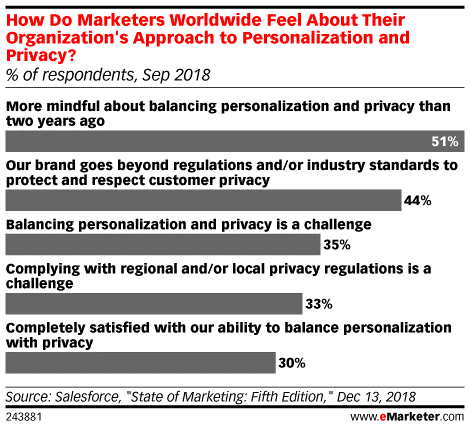
McKinsey recently performed a study to better understand consumers’ reactions to privacy. In looking at industries that consumers receive personalized offers from, the industries they receive personalized communications from and those they wish they did are fairly in sync. Topping the list are consumer goods brands, restaurants and bars, and fashion retailers and department stores.

There were some differences when analyzed by gender. 55% of women in the US versus 49% of men were significantly more likely to welcome personalized messages from restaurants and bars.
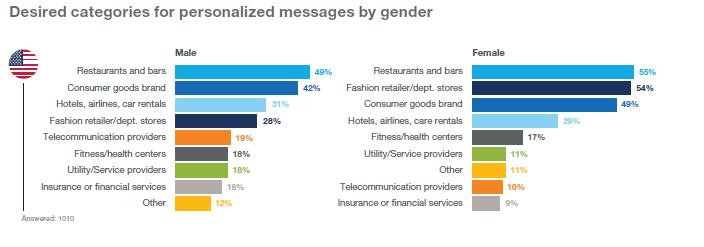
The Mckinsey research also examined the types of offers consumers receive as compared to the type they find most appealing. Product recommendations related to interest and similar product recommendations based on product research were most appealing to consumers in both the US and the UK.
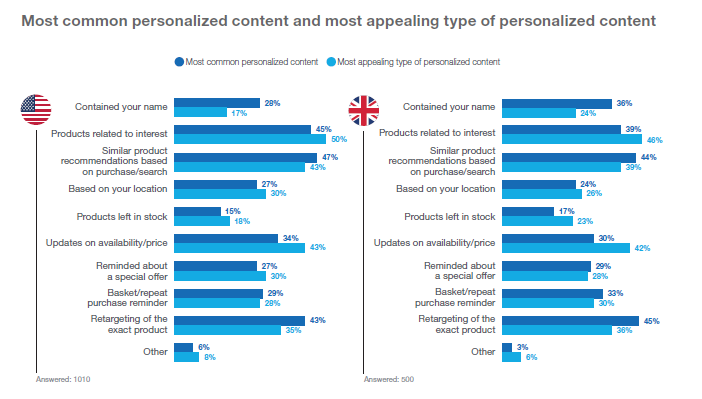
Consumers appear quite open to personalization, even in the changing privacy landscape. However, they would like some control over who has access to their information. 53% of US shoppers say they often or sometimes sign up for personalization, with 19% saying they frequently do so.
Shoppers aged 18-39 are the most eager to sign up to receive personalized messages. In the US, 24% of those aged 18-29 and 28% of those aged 30-39 admit they frequently respond to invitations to subscribe.
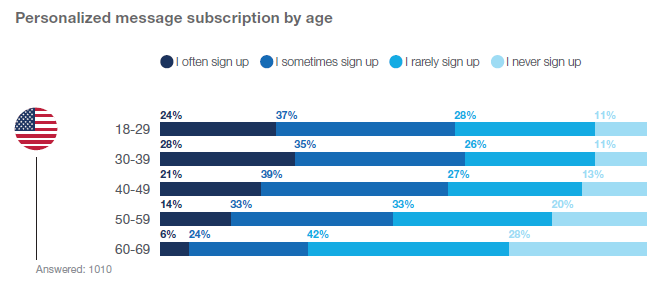
Consumers feel like the messaging they are receiving still fails to hit the market, pointing to more opportunity for brands to infuse more personalization into their messaging. Personalization efforts based on broad segmentation alone, rather than an individual’s specific interests and historical purchasing behavior, fall short as far as consumers are concerned.
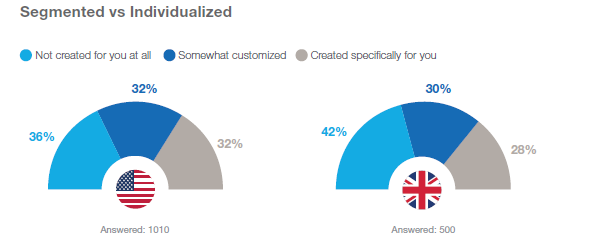
Personalization is working, and consumers take action based on personalization. Almost two-thirds (63%) of respondents said they acted on a personalized message because it was a great deal, while 47% said it was a product they wanted to buy anyway. Other top reasons for acting on personalized communications include the product being within budget range (42%), the product fit with their taste (37%) and, with a nod to brand loyalty, it was from a brand they love (32%).
Consumers in the US are most willing to give up their very basic information, including email address (62%) and basic information i.e. name, gender, birth date (48%). Slightly more than 3 in 10 are willing to share their shopping history (33%) and to answer questions on their preferences (31%).
Consumers are also taking steps to protect their data online. Some 40% of respondents say they only consent to mandatory cookies.
Data for Personalization
To personalize effectively, brands need marketing data insights in order to understand consumer preferences. More than half (55%) of respondents in an Ascend2 survey say that one of the most important types of data they use for personalization is website activity. Additional types of data used for personalization include:
- 47% – transaction activity
- 37% – campaign activity
- 32% – demographic information
- 26% – names
- 24% – company/employment
- 19% – purchasing roles
In another study by Altimeter, a Prophet Company, respondents stated somewhat different results:
- 72% use website analytics as a data source
- 68% use social media metrics
- 58% use CRM systems
- 58% use customer surveys and research
- 57% use customer service records
- 40% use third-party databases
Finding ways to personalize the customer experience should be top of mind for every marketer today. Personalization can be a more difficult technique to master with challenges such as technology and access to data, but the effort is well worth it. Learn how Porch Group Media can help you personalize your customer experiences.
Related Article: Only 45% of Marketers Agree That They’re Getting Personalization Right
Sign up for our marketing tips and resources:





